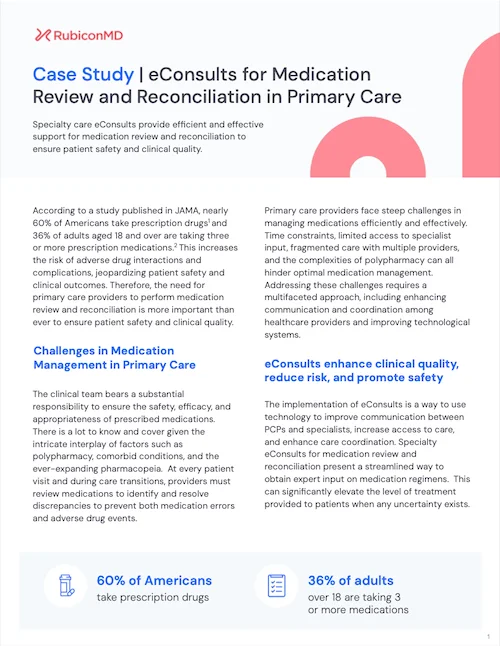Top 5 Ways eConsults Support Trauma-Informed Primary Care
In a recent RubiconMD CME webinar, “Trauma-Informed Primary Care: ACEs, PTSD, and Chronic Stress,” Ludwing Salamanca, MD, PhD of Columbia…
With nearly 17% of the US population aged 65 and over, it’s more important than ever to confront the treatment challenges of seniors living with substance abuse. New, virtual psychiatric interventions can help close gaps in care for these older adults.
As America grapples with a substance abuse crisis that has affected millions of people across all age groups, one population that is often overlooked is seniors. While some older adults find excellent access to geriatric health care, excessive drinking or misuse of medications like opioids or benzodiazepines still tends to be underdiagnosed or undertreated across socio-economic lines. Signs of substance misuse in older adults often mimic symptoms related to aging, such as problems sleeping, memory loss, poor self-care, lethargy, or feelings of sadness. In other cases, seniors may have already developed skills to compensate for the functional impairment due to the use of substances. Different factors contribute to older adults being less likely to speak up and seek care, including the stigma associated with substance abuse, feelings of isolation and an inability to reach out for help, and even the influence of their doctor’s instructions. Additionally, there is a prevailing assumption among providers that seniors are at lower risk for substance use disorders, contributing to suboptimal screening and assessment practices.
A vulnerable population. A self-destructive cycle.
Medical and psychological factors make seniors uniquely susceptible to the misuse of substances or be disproportionately impacted by the effects of alcohol or drugs. For instance, aging contributes to the decline of lean body mass, leading to higher blood concentrations of alcohol than in younger drinkers. Older adults may also turn to substance use or misuse as a means of coping with chronic pain, leading to a vicious cycle that contributes to high blood pressure, liver disease, neuropathies that contribute to falls, adverse interactions with other medications, and even an increased risk of STDs.
Studies show that mood and anxiety disorders are commonly present in older adults with poor physical health. Psychologically, seniors may turn to substances to use them as a coping mechanism for feelings of loneliness, the impact of chronic illness, or grief. Additionally, some medications commonly used to address mental health symptoms, such as benzodiazepines, are also ripe for misuse. Despite the serious risk of injury with benzodiazepines in seniors, these powerful medications are disproportionately prescribed. Coupled with a reduced likelihood of clinical treatment and cultural stigmas around asking for help, struggling seniors are at great risk.
How can primary care providers speed their response to the senior substance abuse crisis? Making compassionate and culturally-sensitive screening and prevention tools available for PCPs can help older patients know the risks of substance use, reduce high-risk behaviors, and avoid adverse events. Along with enhanced access to psychiatric care treatment, PCPs can be well-positioned to intervene and support their senior patients. Many PCPs now look to RubiconMD’s virtual specialty care solutions to make these goals a reality.
Take action now to provide better support and care
Virtual care can play a significant role in managing patients with behavioral health concerns by increasing access to clinical insights that both educate the PCP and support the patient. RubiconMD offers different strategies for addressing mild-to-moderate psychiatric conditions, including substance use disorders.
Here are three ways PCPs can use RubiconMD technology to address complex patient needs, with promising potential for seniors:
The effective management of substance use disorders is a public health imperative, and it starts with delivering evidence-based care. RubiconMD is working to meet the rising demand for behavioral health in primary care for all patient populations, including older adults. Improving access to high-quality, specialty care insights helps PCPs identify, engage, and treat patients earlier, without stigma. Better mental health starts here.
Explore ways to enhance primary care mental health
In a recent RubiconMD CME webinar, “Trauma-Informed Primary Care: ACEs, PTSD, and Chronic Stress,” Ludwing Salamanca, MD, PhD of Columbia…
As primary care providers and health systems transition from traditional fee-for-service models to value-based care (VBC), eConsults are a scalable,…
Access to specialty care shouldn’t depend on your zip code, insurance type, or income level—but for Medicaid patients, it often…

Explore real examples of specialty care eConsults providing efficient and effective support for medication review and reconciliation.